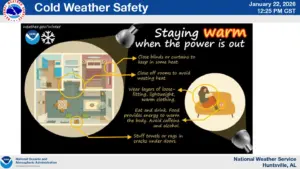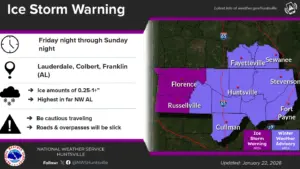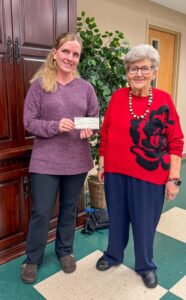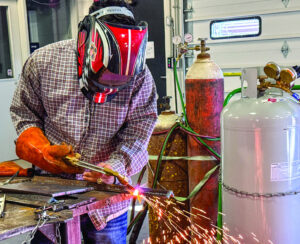SPAN program continues changing lives
RUSSELLVILLE — A small Franklin County program has been a turning point for more than two decades for students who have run out of options.
Known as SPAN, or Special Program for Achieving Network, the initiative offers education, life skills and a path forward for local youth.
Now operated under the Alabama Department of Youth Services, the program delivers individualized instruction, counseling and job readiness training.
It focuses on helping young people overcome challenges at home, at school and in the community so they can become independent, productive members of society.
Courtroom roots
Former District Judge Paula McDowell helped start what became SPAN in 1999. At the time, she said she kept seeing the same young people cycling through juvenile court.
Many of them lacked a stable home life, had fallen behind in school, or had already dropped out.
“It was clear that if we didn’t intervene early, they would keep coming back,” McDowell said. “We needed to catch some of these young people young and early, and give them tools to face a big, bad world.”
Originally run as a local initiative called the City Program, it later came under state oversight and was renamed SPAN. McDowell said the structure evolved, but the core mission stayed the same.
Over the years, some graduates have gone on to successful careers in law enforcement, management and skilled trades.
“It’s been amazing to look back over the years,” she said. “We’ve got students who are now productive citizens because of SPAN.”
A key part of the program’s success is the commitment of its staff. McDowell praised Director Jamie Harris and his team — including his wife, Mandy — for their work with students.
“The general public doesn’t recognize just how difficult some home lives are for children,” McDowell said.
She added that while it’s not easy, the program helps students develop the tools they need to thrive.
“Jamie and Mandy work with the kids day in and day out so they can learn how to get out of their situation. Getting out of it requires hard work, dedication and learning how to take care of yourself.”
Students in SPAN may be referred by a judge, a probation officer or their school. Each receives an individualized education plan tailored to their academic level and personal goals.
For some, that means catching up on missed credits. Others may prepare to earn a GED.
A judge’s perspective
Current Franklin County District Judge Jamie Sumerel said SPAN is an essential tool for the court system.
He explained many studentswhoarereferredto the program are no longer allowed to attend their regular school because of disciplinary issues.
“The SPAN program gives them an opportunity to either get caught up when they’re so far behind they may never catch up in a normal school setting, or get on track to earn their GED,” Sumerel said.
He added that completing the program isn’t easy, especially with the GED now considered an 11th-grade level test.
“SPAN tailors education to prepare them for it,” Sumerel said.
He said the program’s job training component is also critical.
“I’ve had close to 100 former clients who attended SPAN,” he said. “Many are now successful, wage-earning citizens.”
When it works, he said, the long-term impact is easy to see.
“Juvenile court kids are never happy when they’re here, but if what we do works, they come back later as friends,” Sumerel said. “They’ll check in, say hello and tell me how they’re doing.”
Life inside SPAN
A typical day at SPAN blends academics with practical life lessons. Students work in small groups or one-on-one with instructors, covering core subjects like math, reading and science.
They also participate in workshops on budgeting, cooking and job interviews. Harris said the goal is to prepare the whole student, not just academically, but personally.
“We want them to leave here with the knowledge to succeed in school or at work, and the confidence to navigate life’s challenges,” Harris said.
That includes topics like communication, time management and decisionmaking.
SPAN also partners with local businesses and nonprofits to offer job-shadowing, shortterm work and volunteer opportunities.
Students may help with events, assist at agencies or work alongside skilled tradespeople.
Success stories
The program’s impact is perhaps best seen through its graduates.
Ivan Lucas said he was behind in school and running out of options when he came to SPAN.
“They didn’t just give up on me,” Lucas said. “They pushed me to get my credits, taught me how to set goals, and made me believe I could actually do something with my life.”
He went on to earn his diploma and now works in the automotive industry.
Dominic Hall said SPAN gave him the structure he needed at a critical time.
“I was going down the wrong path,” Hall said. “SPAN kept me focused and gave me people who cared about what happened to me. Without it, I don’t know where I’d be right now.”
Mary Kathryn Wiggins said her time in the program helped her escape a dangerous lifestyle.
“I was getting in trouble, acting out,” Wiggins explained.
She said the program gave her something she hadn’t had before structure, support and a future.
“That program saved me from a lifelong addiction to drugs because the road I was headed down was drugs. That’s what my friends were doing, and it’s what I was doing.”
With help from her parents and the program staff, Wiggins earned her GED at 16, spending about three years in the program.
“Looking back, it was a blessing,” she said. “That program is one of the best things Franklin County has for the schools.”
Looking ahead
Harris said the program relies on strong partnerships with schools, courts, employers and local organizations.
Teachers help coordinate lesson plans. Probation officers monitor progress. Employers provide realworld opportunities.
“It’s a team effort,” Harris said. “We can’t do it alone. The more the community supports these students, the better chance they have to succeed.”
Nonprofits and social service agencies also step in to help with needs like transportation, clothing or housing.
McDowell said her hope is for every county to one day have a program like SPAN.
“I would love to see it as its own line item in the budget,” she said. “Every county should have the chance to have a program like this. It changes lives.”
Sumerel echoed the idea, saying expansion could prevent more young people from getting stuck in the cycle of court involvement.
“It’s an investment in the future,” he said. “When you help a kid get back on track, you’re not just changing their life — you’re changing the community for the better.”
For now, Harris and his team remain focused on the work at home.
“These kids are capable of incredible things,” Harris said. “They just need someone to believe in them and give them the tools to succeed.”








